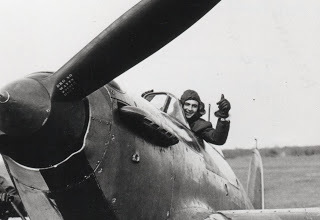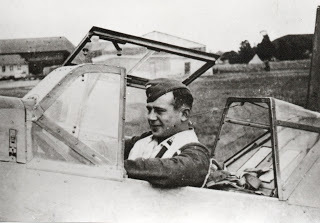Helena P. Schrader's Blog, page 27
February 5, 2021
Dowding's Counter-Part - Hermann Goering
In the Battle of Britain, Air Chief Marshal Lord Dowding faced a Luftwaffe led by Reichsmarshall Hermann Goering. As overall C-in-C of the Luftwaffe, Goering was not technically Dowding's military counterpart. Yet Goering's interference in the Battle and his high-profile leadership style make if fair to say that Goering and Dowding faced off against one another.
Two more different men are hard to imagine. While Dowding was retiring and unassuming almost to a fault, Goering was bombastic and loved the limelight. Yet it would be wrong to dismiss Goering as a clown or a fat buffoon. He was far more dangerous, sinister and complex than such a portrayal suggests.
Goering was born into the ruling elite and raised in a castle belonging to his mother's Jewish lover. He was commissioned in the Army at aged 19, two years before the start of WWI. During the war he transferred to the fledgling air force, and as a fighter pilot had twenty-two credited victories, for which he was awarded the "Pour le Merite" or "Blue Max" -- the highest German medal at that time. He took over command of Manfred von Richthofen's famous fighter wing after Richthofen's death in July 1918.

Goering could not come to terms with Germany's defeat and went into voluntary exile in Sweden, where his good looks and daring flying won him admirers and social success -- including captivating the wealthy Swedish baroness, Carin von Rosen. Their affair scandalized the Swedes, however, and they fled to Bavaria where they married in 1923 after Carin divorced her first husband. Meanwhile, Goering had met and become mesmerized by Hitler, whom he met in 922. Despite their differences of class and personality, the bond between the two men was to hold almost to the last day of Hitler's life. Despite his later failings, Goering always retained a place of privilege in Hitler's inner circle that neither Goebbels or Himmler could displace.
Goering earned that place with his early dedication, sacrifices and effectiveness. Goering took over the Sturm Abteilung (SA) -- Hitler's thugs -- and turned them into a (comparatively) disciplined troop capable of much more effective disruption, brutality and intimidation. Despite his best efforts, however, the SA did not prove a match for the Bavarian police and Goering was wounded in the groin during the abortive "Beer Hall Putch" of 1923.
While convalescing, he was forced to surrender command of the SA to Ernst Roehm. His treatment, furthermore, entailed morphine and he soon became addicted. The addiction caused mood swings, weight gain, and led him to the brink of ruin. He was twice institutionalized for addiction in Sweden, and meanwhile he and his wife bankrupted themselves with donations to the Nazi Party.
In May 1928, however, he was one of only 12 men elected to the Reichstag on the Nazi Party slate. This provided not only a salary, but respectability and a platform from which to work. He proved to be a gifted fund-raiser and recruiter, equally at ease in upper-class cocktail parties or out haranguing workers and farmers. By September 1930, the Nazi party had increased its seats in the Reichstag to 107. Two years later it was 230 -- and Goering was the President of the Reichstag (equivalent to the Speaker of the House in the U.S.).
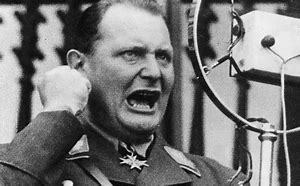
Goering used his position to systematically undermine democracy, something he managed in part because of his good relationship with the increasingly senile Paul von Hindenburg, the official Head of State or Reichspraesident. When Hitler, as the leader of the largest faction in the Reichstag, was appointed Reichschancellor, Goering was appointed Minister of the Interior in Prussia, a position he used to establish the Gestapo and the first concentration camps. He may also have played a role in orchestrating the fire in the Reichstag that became the pretext for Hitler demanding -- and receiving -- dictatorial powers.
In the first years of the Nazi regime, Goering was Hitler's unquestioned "right-hand-man" and his bulwark. In addition to using the Gestapo and Concentration Camps to purge the country of opposition leaders, independent journalists and other democratic elements, he used threats and bribery to bludgeon and seduce support from Germany's industrial elite. In 1934 he took his revenge on Roehm for replacing him as head of the SA by masterminding the slaughter of the SA leadership during the completely fabricated "Roehm Putch" -- an orgy of murder against some of the Nazi party's most loyal (and brutal) supporters. The purge has gone down in history as the "Night of the Long Knives" although it lasted three days. (Below Ernst Roehm.)
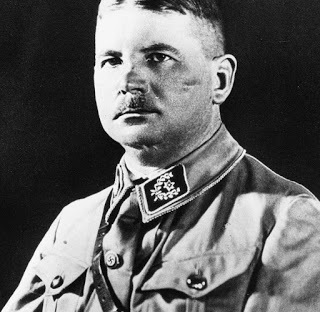
Although Goering surrendered control of the security apparatus to Himmler in the aftermath of this purge, in 1936 he was entrusted with ramping up Germany's synthetic oil and rubber production.He was so successful that Hilter appointed him Minister of Economics in 1937. He used this position not only to build autobahns, ramp up steel production, improve harvests and reduce unemployment, but to build up armaments, stockpile munitions and other war materiel -- and to enrich himself.
His appetite for luxury and display along with fine art, fine wine and good food was insatiable. He designed ever more flamboyant uniforms for himself, built a huge hunting lodge, maintained dozens of personal cars, had a personal armed train with a hospital car (among other things). He wore rings on every finger, and when he remarried in 1935 (his beloved wife Carin had died of a heart attack in 1931, aged only 38), he had a wedding parade with 30,000 soldiers.
All the while he was head of Germany's civil aviation and the secret Luftwaffe, which came out of hiding in 1935. Goering attracted highly competent men to the new and prestigious organization, men like Walter Wever, Hans Jeshonnek, Ernst Udet and Erhard Milch. The Luftwaffe also enjoyed priority in recruitment and huge budgets. It grew rapidly and benefitted from a sophisticated German aeronautics industry. The Spanish Civil War provided an excellent testing ground for men and machines before the outbreak of WWII. Among other things it demonstrated that the Stuka dive bomber (shown below) could be a highly successful ground support and terror weapon.
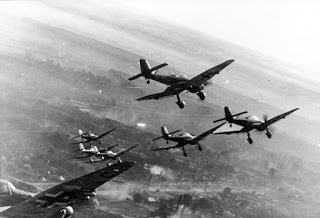
The Luftwaffe, whose machines and tactics had largely been devised for close combat support roles, was instrumental in Germany's victories over Poland and France. These successes combined with Goering inflated sense of self-worth led him to promise Hitler that the Luftwaffe would destroy the BEF at Dunkirk and then that it would force Britain to surrender.
But Goering had never been more than a captain (Squadron Leader). He had never gone to staff college, much less served in a staff position. He had no first hand experience with modern aircraft, and no understanding of modern fighter tactics. His interference in the direction of the Battle of Britain was counterproductive -- including backing Kesselring's demands to attack London. Goering probably did so for political reasons -- to bolster his own prestige (which was tarnished by RAF attacks on Berlin and other German cities, although these raids were no more than pinpricks at the time). He was also motivated by the need to regain favor with Hitler, who wanted revenge for the attacks on Germany. Whatever his reasons, the targeting of London took the pressure off Fighter Command's airfields and helped ensure RAF withstood the attacks long enough to force a postponement of the invasion.
The Luftwaffe never regained it's mastery -- despite such brilliant technical advances as the FW190 (that for nearly a year out-classed all allied fighters) or even the ME262, which was even more superior. Technical genius could not make good the steady attrition in machines, men and morale that set in on the Western front. Meanwhile success in the East was also ephemeral. Despite much higher kill-to-loss ratios, the sheer size of the task and the weather eventually took its toll. Goering, meanwhile, remained out of touch with reality and vastly overestimated his own and the Luftwaffe's capabilities. Among other errors, he promised to supply the Sixth Army, trapped at Stalingrad, entirely by air. It couldn't be done. Goering -- and the Luftwaffe -- had failed again.
Goering played only a nominal role in the waning years of the Third Reich. He was tried at Nuremburg and condemned to death. His sentence was earned many times over. He had been ruthless, undemocratic, and corrupt ever since the Nazi came to power. He was personally responsible for a variety of crimes from the establishment of the Gestapo and the early concentration camps to the murder of hundreds in the purge of 1934. Yet while he shamelessly stole assets from Jews, he also held his hand over those he personally liked (or thought useful) with the famous phrase: "Wer Jude ist bestimme ich." (I decide who is a Jew.) Likewise a glimmer of honor emerges from his refusal to expel personnel implicated in the July 20th Plot from the Luftwaffe. Unlike the army that unceremoniously threw their former comrades to the Gestapo and so knowingly allowed them to be tortured and executed, Goering had all Luftwaffe officers tried before military tribunals. They were not tortured and some were allowed to "redeem themselves" on the front. Goering took his own life rather than facing being hanged like a common criminal on Oct. 15, 1946.
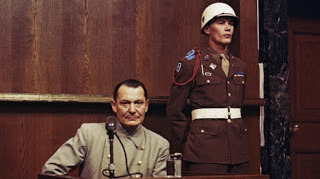
Goering has only a cameo role in "Where Eagles Never Flew."
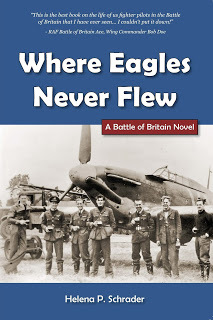 Buy now - Itasca!
Buy now - Itasca!Buy on Amazon.com!
Buy on Amaxon.co.uk!
Buy on Barnes and Noble
Women on the Frontlines -- An Excerpt from "Where Eagles Never Flew"
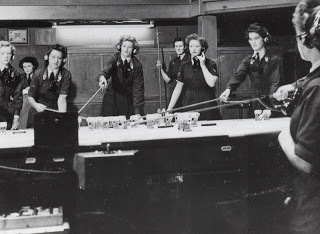
Setting: RAF Tangmere, 16 August 1940Sector Control Room
As the earth stopped its convulsive shudders and the sound of explosions faded, Bridgespicked himself up off the floor and looked down over the balcony at the scene below. Plaster dust covered all of them to various degrees, and the markers onthe table had been knocked over and shaken into meaningless heaps. One of the large lights had burst, shattering glass everywhere, and Corporal Winterswas already applyingfirst aid to a girl who had been badly cut in the hand. Although she was still wearing her steel helmet,so he couldn’t see her face, Bridges thought it was ACW Hadley. Whoever it was, she hadn’t let out so much as a shout when she’d been hit by the glass.
“Are there any other casualties down there, Winters?” Bridges called.
The WAAF Corporal glanced up at him, her face white with plaster dust, and shook her head. “No, sir.”
Around her the other WAAF were crawling out from under the table, dusting off their knees and removing their steel helmets. As he watched,they started replacing the displaced markers, talking among themselves in low voices about where things had been and also pulling their head-phones back on. Even Bridges, who had alwaysexpected they would do well under fire, was impressed. This wasn’t just an absence of hysteria; it was professionalism of the highest order.
“Sir.” His attention was drawn by ACW Roberts, on the balcony beside him. He had reassigned her as his clerk so she could keep the transcript of combat transmissions that Allars had asked for. She also manned the switchboard.
“Yes, Roberts?”
“The telephone lines to Uxbridge are out of order, sir.”
“Right. See if you can reach Kenley or Middle Wallop and have them relay messages to and from Uxbridge.”
“Yes, sir.”
“Robinson,” he addressed the Warrant Officer, “see if you canfind out exactlywhat damage has been done so we can report it to Uxbridge as soon as possible.”
“Yes, sir.”
Bridges leaned over the gallery. “Winters?”
“Sir.”
“Anything else coming in?”
“Ventor’s down again, sir. We’re blind unless they come in east or west of here and then turn.”
“Understood.” That explained how it had happened.
Behind him Robinson was reporting. “Two hangars collapsedin direct hits, sir, and the motor pool has been obliterated under the collapsed garage roof.”
The sound of sirens wailed through the walls, and the deeper-throated hooting of the fire engines penetrated, too. The door was wrenchedopen, and a man in steel helmet and Flight Sergeant’s stripesstuck his head in. “I need volunteers to come out and mark a runway for our aircraft to get down between the bomb-craters and the unexploded bombs!”
“Go on, any of you who want to go.” Bridges released them all. If RDF and the lines to Uxbridge were down, there wasn’t a lot they could do here.
Click here to see a video teaser of Where Eagles Never Flew
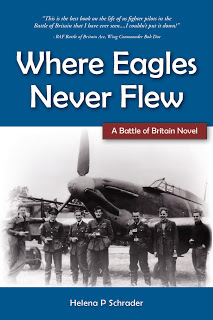
Buy now - Itasca!
Buy on Amazon.com!
Buy on Amaxon.co.uk!
Buy on Barnes and Noble
January 29, 2021
The Battle of Britain: Women on the Front Lines
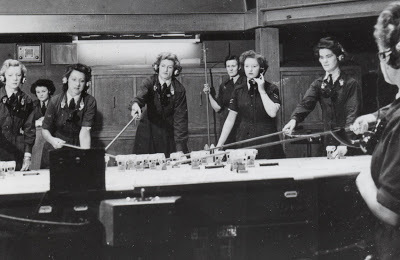
If ground crews are only rarely mentioned in accounts of the Battle of Britain, the women who actively took part in the battle are all but invisible. Yet both the RAF and the Luftwaffe employed women auxiliaries in highly responsible positions.
The RAF’s positive attitude towards women was exceptional among the services. The RAF actively encouraged the establishment of a Women’s Auxiliary, which by the end of the war served alongside the RAF in virtually all noncombat functions.
Even before the start of the war, however, the vital and highly technical jobs of radar operator and operations room plotter, as well as various jobs associated with these activities, were identified as trades especially suited to women. The C-in-C of Fighter Commander, ACM Dowding, personally insisted that the talented women who did these jobs move up into supervisory positions – and be commissioned accordingly.
During the Battle of Britain over 17,000 WAAF served with the RAF, nearly 4,500 of them with Fighter Command. A number of WAAF were killed and injured and six airwomen were awarded the Military Medal during the Battle.
Despite Nazi ideology about the place of women being exclusively in the home, the Wehrmacht was also forced to rely increasingly on women auxiliaries. The expansion began after the dramatic victories in the West in May/June 1940 and continued throughout the war. The number of women serving with the Wehrmacht increased from roughly 35,000 women in uniform in 1941 to over 150,000 when Germany surrendered. General conscription for women, industrial and military, was introduced in Germany after the loss of an entire Army at Stalingrad in early 1943, but the bulk of the women serving in the women’s auxiliary forces before 1945 were volunteers. These women are far too often forgotten entirely in accounts of the Second World War.
Click here to see a video teaser of Where Eagles Never Flew

Buy now - Itasca!
Buy on Amazon.com!
Buy on Amaxon.co.uk!
Buy on Barnes and Noble
January 22, 2021
"There was a bloody great free-for-all..." -- An excerpt from "Where Eagles Never Flew"
In an earlier entry, I noted that in the air war during World War Two victories claims on all sides were greatly exaggerated. Aerial combat was fast-paced and highly confusing, leading to many false and multiple claims. This excerpt from "Where Eagles Never Flew" is intended to highlight the issue.
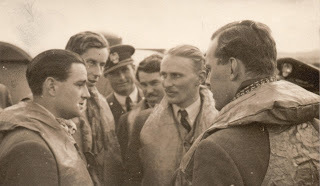
(Setting: RAF Tangmere, Late August 1940)
"I understand you got a Heinkel, Woody." [The CO addressed one one of his pilots.]
"Yes, sir."
"Well done. I saw you put one engine on fire on your first pass. Did you go back around for it?"
"Ah. No. Actually, I didn't even see that. I was afterwards. I broke left and chased after another one. It spun out of control and I saw two of the crew jump."
"Well done. Donohue?"
"I got in some good bursts at a 110 and saw the starboard engine catch fire, but I didn't see him go in. Got distracted by a Messerschmitt."
“Eton?"
“There was a bloody great free-for-all after you – I mean – we came out the other side of the bomber formation and got jumped on by a horde of Messerschmitts. It can’t have been the ones that had been following us. They had to come from somewhere else. F/O Ware tried to climb into them like you said, but they were already coming down, and one cut in front of me. I got in a good squirt and when I looked back, there he was streaking down with a long tail of smoke. I know he went in.”
“Very likely, but the 109s were coming down because they’d been engaged by Spitfires at higher altitude,” Priestman pointed out. “You probably shot at an already dead pilot.”
Eton frowned. “But, sir, he passed right through my sights.”
“What speed do you think he was going?”
“400 mph at least, sir!”
“And how far away was he?”
“Maybe five hundred yards – six hundred at the most.”
The others just burst out laughing. Priestman waited for them to quiet down. “Eton, do you want to step inside and let me give you a short lesson on the Browning machine gun.”
It was not a question, and the boy looked decidedly disheartened as he stepped into the comparatively dim light of the dispersal hut.
“Trigonometry wouldn’t hurt either, sir,” Sutton called after them.
Click here to see a video teaser of Where Eagles Never Flew

Buy now - Itasca!
Buy on Amazon.com!
Buy on Amaxon.co.uk!
Buy on Barnes and Noble
January 15, 2021
The Battle of Britain: Claims and Counter-Claims
Over the years much has been made of the “exaggerated” claims made by the RAF during the Battle of Britain — far too much.
It is the nature of all aerial dog-fighting that it is very fast, brief and confused. Pilots were flying at the extreme limits of their physical capabilities and the limits of their machines (instances of aircraft breaking up and pilots being killed by the force of gravity alone are documented). Under the circumstances it was difficult to get in more than a quick “squirt” of fire. Usually one or both aircraft took violent evasive action after an exchange of fire.
If seconds later the fighter pilot saw an enemy aircraft crashing, then it was an easy mistake to think it was the one he had just shot at. The larger the number of aircraft involved, the more likely it was that several pilots fired at the same target. The result was multiple claims made for the same downed aircraft. Thus, on September 15, when the Big Wings of 12 Group were engaged over London, the RAF claimed 185 enemy aircraft shot down when, in fact, Luftwaffe lost only 56 air. In fact, it was on this day that no less than 9 pilots put in claims for the same Dornier.
The key problem at the time was that claims were made to squadron intelligence officers by excited young men (the pilots were generally between 18 and 22 years old) immediately after combat. The squadron intelligence officers usually weeded out the duplications and contradictions and implausible claims put in by their own pilots, but squadron intelligence officers did not compare notes between squadrons. Instead, squadron claims were simply added up, and so the above kind of multiple claims for the same aircraft crept into the official figures.
At the time, however, British morale benefited from these exaggerated claims, and no one had any particular interest in double checking much less correcting the filed claims. The bottom line is that the British shooting down more German aircraft than they were losing — even if by a far lower margin than claimed. Ultimately, that was all that mattered because it was enough. The RAF entered the Battle of Britain as the under-dog, and it won the Battle of Britain against all the odds.
Click here to see a video teaser of Where Eagles Never Flew

Buy now - Itasca!
Buy on Amazon.com!
Buy on Amaxon.co.uk!
Buy on Barnes and Noble
January 8, 2021
"The whole system stinks!" -- An Excerpt from "Where Eagles Never Flew"
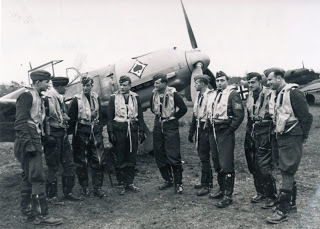
(Setting: Jagdgeschader 23 following a particularly bloody air battle with high bomber losses, late August 1940)
“Where were you?”
“I went to see Major Schulz-Heyn.”
“Who’s that?”
“The acting Geschwaderkommandeur of KG 51 – after their previous CO, Dr. Fisser, bought it yesterday. Do you know how many kites they lost yesterday? Ten! Ten aircraft and crew because that arsehole Bartels wanted to run up his own damned score against the RAF. He can’t bloody take it that Galland and Mölders have left him standing!”
Ernst was appalled by the losses, but he still didn’t think Christian should be talking like this about their CO.
“The whole system stinks!” Christian told him before Ernst had decided what to answer. “They only give away medals and promotions for kills.”
Ernst decided it was better not to enter this discussion. He rather suspected Christian might be less contemptuous about rewarding kills if only he had one or two of his own. So, Ernst changed the subject. “The ground crews are saying you’re going to be put before a court martial.”
“Only the ground crews?”
“They heard the CO threaten you after you landed yesterday and were pretty shaken up. Dieter and Busso, however, say they can’t afford to ground you. We’re too short of pilots. They said the CO was just blustering.”
“See. Nothing to worry about.” Christian grinned and shrugged – unconvincingly, Ernst thought.
“They don’t have to ground you to court-martial you, Christian. They could let you fly ops until your trial.”
Christian shrugged. “When I walked into the mess at KG 51, you would have thought I was a Jew. They all stared at me. Not one man nodded in greeting, much less smiled. They just stared at me. It was the coldest reception I’ve ever had in my life. And they were right.”
“No, they weren’t! You did your best! It’s not your fault that so many of them got slaughtered.”
“I didn’t hit a damn thing – again. Not one goddamnned English fighter!”
“You fire too soon, Christian.” Ernst said it softly, wincing even as he spoke, afraid Christian would be mad at him for criticising.
“What was that?”
“You fire too soon, before you’re in range.” Christian considered Ernst for a long moment, his head cocked. “Just when did you notice this?”
Ernst shuffled his feet unhappily and shrugged. “We’ve been flying together for weeks.”
“You could have said something earlier.” Christian sounded annoyed, but not angry.
Ernst took a deep breath and risked looking at him squarely. He answered honestly, “What right have I got to criticise? Most sorties I don’t even fire my guns – just like yesterday. I certainly haven’t hit anything. At least you try. And you scared the Hurricanes away yesterday. They broke in all directions at the sight of your tracer.”
Christian smiled sadly. “Thanks, Ernst.”
“It’s true.”
“Jein. They broke in all directions and some of our bombers made it home – yesterday. But the Hurricanes will be just as numerous today because I didn’t get any of them. Maybe they’ll get a Junkers today – because I didn’t get any of them yesterday. We can’t beat the RAF by scaring them off. We’ve got to destroy their aircraft and pilots faster than they can be replaced. It’s as simple as that.”
“Then the system of rewarding kills is right after all?” Ernst said it with a little whimsical smile, expecting a heated denial.
But Christian sighed and agreed, “Yes, it’s right after all….”
Click here to see a video teaser of Where Eagles Never Flew

Buy now - Itasca!
Buy on Amazon.com!
Buy on Amaxon.co.uk!
Buy on Barnes and Noble
January 1, 2021
The Battle of Britain: Kills Counted
In the Battle of Britain, victory depended not only on surviving but inflicting damage on the enemy: in other words "kills" counted. But the institutional culture around aerial victories was markedly different in the RAF and the Luftwaffe.
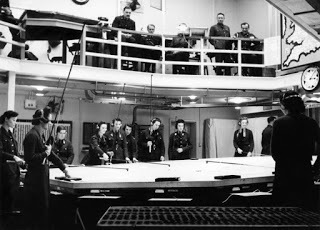
Fighter Command could have reduced RAF losses simply by withdrawing beyond the range of the German fighters, but that would not have defeated the purpose of Fighter Command. The military objective was to cause enough damage to the Luftwaffe to make it either unable or unwilling to provide the necessary air cover for an invasion. If the Luftwaffe hadn’t been losing aircraft and aircrew that Hitler wanted for his aggressive plans elsewhere, he might have very well opted for the invasion.
Kills, however, came predominantly from a limited number (approximately 5%) of the pilots — on both sides. What is striking is the difference in ethos behind those kills.
The German tactics, formations, promotions and public relations all encouraged individual leaders to run up large scores. The Luftwaffe enabled and encouraged individual fighter pilots to become “aces.” If a German pilot was an “ace,” he was not only lionized by the press and praised by his peers and superiors – all the way to Hitler himself, but he was given a wingman and then an entire “Schwarm” to protect him so he could concentrate on killing. Moelders, Galland and Wick had more than fifty kills (56 for Galland and Wick each) before the end of 1940; by the end of the war, many German pilots had 100s of kills.
In the RAF, in contrast, the highest scoring English pilot "Pat" Pattle was credited with just 51 victories including many against the Italian Air Force, while the highest scoring ace in the Western theater, "Johnny" Johnson had 38 victories in the course of the entire war. On the one hand, the continuous rotation of squadrons and pilots in and out of combat areas resulted in far lower individual scores in the RAF generally. On the other hand, the ethos was different. RAF pilots brought with them a notion of “team spirit” and viewed bragging as “bad form.” The RAF did not really encourage the creation of “aces” and even medals were awarded for exceptional bravery or outstanding flying, assistance to one’s comrades and the like, rather than merely for “kills.”
Yet the RAF inflicted losses at a rate of almost 2 to 1 — and morale did not break. Given the losses and the sheer physical demands placed upon the RAF pilots at the time, it was their ability not only to keep flying but to keep drinking and laughing that awed their countrymen, their leaders and their enemies — when they found out.
Click here to see a video teaser of Where Eagles Never Flew

Buy now - Itasca!
Buy on Amazon.com!
Buy on Amaxon.co.uk!
Buy on Barnes and Noble
December 26, 2020
“Some kind of stupid bird from Down Under.” -- An Excerpt from "Where Eagles Never Flew"
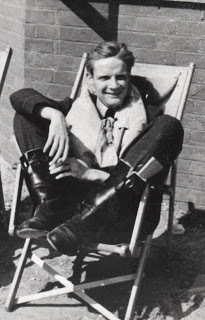
Air Vice Marshal Park got to his feet and went to the bar. Coming up behind Murray, he asked, “Is that another Kiwi I hear?”
Murray spun around, totally flabbergasted. “Sir? You’re a New Zealander?”
But the others were sputtering, “Kiwi? What’s a Kiwi?”
“Some kind of stupid bird from Down Under, I think.”
“Ugly little runt, as I remember.”
“A bird that can’t fly.”
“Well, now you have met two that can,” Park countered, his hand on Murray’s shoulder, as he turned to Murray again and asked, “So how are you getting on?”
“Food’s bad. Beer’s terrible. Weather’s bloody awful. But the Spitfire’s absolutely wizard, sir!”
“Except for the fact that it has a retractable undercarriage,” Priestman noted dryly, causing the trainees to burst into a new round of whooping laughs.
“Yes, bloody nuisance that undercarriage, sir,” Murray agreed soberly. “Couldn’t they build the thing with a sensible fixed base?” he suggested.
Park smiled faintly. “I don’t think we have time for major design changes at the moment. Now, I’m afraid I must be on my way, but maybe I’ll see one or the other of you in 11 Group one of these days.” He shook hands with each of the young pilots, one after another.
“I’m raring to go, sir,” Murray assured him, “but the skipper here,” he nodded to Priestman, “seems to think I still have a few things to learn.”
“All I ask is that you land on the wheels rather than the belly.”
Park laughed with them and then looked at each of them in the eye again. “Best of luck to all of you.”
As he started for the door, Kennel caught up with him, and Park remarked as they left the Mess together, “Keep their spirits up, George. We need them like this.” Another volley of laughter followed them out into the night, as if to underline what he meant.
Click here to see a video teaser of Where Eagles Never Flew

Buy now - Itasca!
Buy on Amazon.com!
Buy on Amaxon.co.uk!
Buy on Barnes and Noble
December 18, 2020
The Battle of Britain: Who were "the Few"?
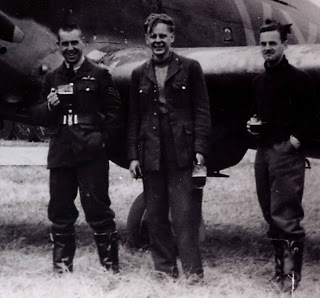
It would be easy to assume that the vaunted RAF “team spirit” that I talked about in an earlier entry held sway because the pilots were so similar to one another. It would be easy to imagine a tiny elite like the knights of earlier centuries or the Spartan guard with Leonidas at Thermopylae. After all, this was a Britain that was still overwhelmingly white, Christian and intensely class conscious.
Yet RAF Fighter Command was surprisingly diverse for the period. Of the nearly 3,000 RAF pilots who flew at least one sortie during the Battle of Britain, only 80% were British citizens. Twenty percent came from the Dominions and/or other Allied countries. The largest number of foreigners to participate in the Battle were Polish, accounting for 145 pilots, and the second largest foreign contingent flying for the RAF came from New Zealand with 126 pilots. Pilots also came from Canada, Czechoslovakia, Australia, Belgium, South Africa, France, the United States, Ireland, Rhodesia and Jamaica.
Even more astonishing, however, is that fully one third of the pilots who flew in the Battle of Britain were Sergeants. That is, they were not the children of privilege, not the scions of the aristocratic families or the product of “Oxbridge.” The Sergeant Pilots of the RAF were men with more mundane backgrounds, men without the ‘right accent,’ who had not gone to public schools, and sometimes had even left school at 14 or 15.
This was because since its inception, the RAF had actively encouraged recruitment from all sectors of society, intentionally breaking with the rigidly class-conscious traditions of the Royal Navy and Army. The RAF had provided scholarships to the Royal Air Force College at Cranwell for exceptional young airmen and apprentices. It had launched a special program to encourage ground crews to receive pilot training. The RAF Volunteer Reserve was established to enable young men still in civilian life without the means to finance flying lessons to learn to fly at RAF expense. These pilots almost invariably came from the classes of society whose sons did not traditionally go to public schools, University or the Officer Corps.
In the Battle of Britain, pilots of the VR flew, drank and joked alongside the titled and privileged pilots of the University and Auxiliary Air Squadrons and the regulars, who had graduated from Cranwell. Literally, the sons of dukes and miners served in the same squadrons, fulfilling the same duties, taking the same risks, and reaping the same rewards. Most of the Sergeant Pilots of the Battle of Britain who survived were later commissioned, and often rose to senior command.
Click here to see a video teaser of Where Eagles Never Flew

Buy Now!
Buy on Amazon!
December 11, 2020
"Flying is dangerous. Flying Spitfires is very dangerous.” -- An Excerpt from "Where Eagles Never Flew"
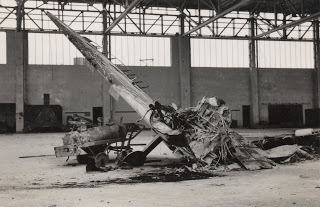
(Setting: An Operational Training Unit following a fatal accident: Early August 1940)
Kennel was waiting for him as he slipped to the ground. “The police have already found him.” Priestman just looked at Kennel, not daring to form the question. “Flew straight in at an estimated 300 miles an hour.”
“I wasn’t flying 300 miles an hour.”
“Maybe not but Acting Pilot Officer Taylor apparently was. Come back up to my office with me.” As they started across the field, the other trainee pilots clustered around. They all looked shocked and shaken. Kennel sent them away. “Stand down. There’ll be no more flying today – or lectures.”
“Is there any hope, sir?” One of the youngsters asked.
“No. He’s been found dead.” Kennel led Priestman into his office. The Adjutant handed a glass of scotch to him.
Priestman took it and sipped at the golden liquid unhappily. He didn’t know what to say.
“There will be an enquiry, of course. The Met was wrong. I shouldn’t have opened the airfield. You should have returned sooner. God knows what Acting Pilot Officer Taylor should have done – but it wasn’t to fly into a mountain at 300 mph.” He paused, sighed. “I’ll write to the next-of-kin. Can you give me all the details you have on Taylor?” This latter was addressed to the adjutant, who nodded. “Anything you can add?” Kennel asked Priestman.
“He was…” Priestman searched for words to describe a young man he had known barely a week. “… insecure. He kept trying to cover it up with bravado.”
“Do you think he’d drunk too much last night?”
“Very likely. I wasn’t with them, but they crashed in late enough.”
“We’d better talk to one or two of the others about that.”
“What does it matter now? You’re not going to put that in the letter to his next-of-kin,” Priestman added a little alarmed.
“No, but it might help with the enquiry.”
Priestman had already forgotten about that, but he supposed this would be the death knell to his career. He’d barely survived the last enquiry. They were bound to throw him out now. God help him, he’d be drafted into the Army!
His expression of foreboding was so explicit that it moved Kennel to remark, “Look, Priestman, there’s no need to look as though you expect to be hanged. We all bear a share of the blame, but things like this happen in training all the time. Flying is dangerous. Flying Spitfires is very dangerous. Give a bunch of teenage boys an extremely fast, powerful aircraft, and the instinct of half of them is to crash it one way or another. It doesn’t help that the Hun is killing, on average, three to four of our pilots every day. Fighter Command needs trained replacements, and it needs them sooner rather than later. If we close down every time conditions aren’t ideal, we’ll either not deliver enough pilots soon enough or we’ll deliver untrained pilots to the operational units – and the Huns will have even more of a field day shooting them out of the sky.”
“That’s over a hundred pilots a month,” Priestman remarked slowly, as he registered what Kennel had just said.
“And half again that many hospitalised,” Kennel added.
“You’re telling me Fighter Command casualties last month were roughly 150 pilots?” Priestman wanted confirmation. “That’s more than six full squadrons.”
“Yes, it is.”
“At that rate, it doesn’t matter how many of them we shoot down. Fighter Command will cease to exist by the end of the year.”
Kennel only shrugged in acknowledgement. They stood there in silence, and now they could hear rain pelting against the windows and the wind howling as a full gale tore down from the Irish Sea. They were all thinking the same thing: the Germans hadn’t even started their main assault yet.
Click here to see a video teaser of Where Eagles Never Flew

Buy Now!
Buy on Amazon!


